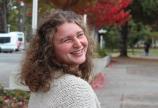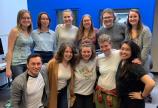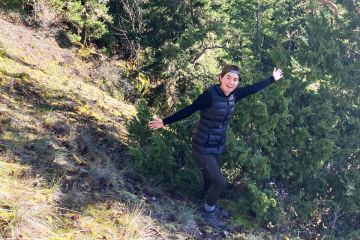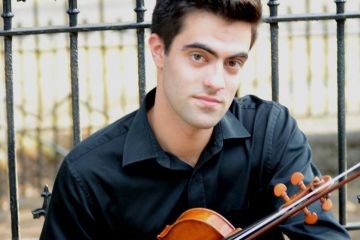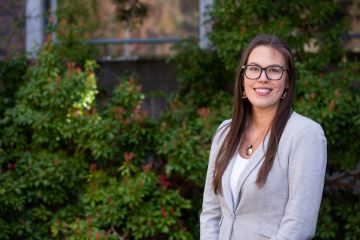Asking new questions and building new friendships
- Philip Cox
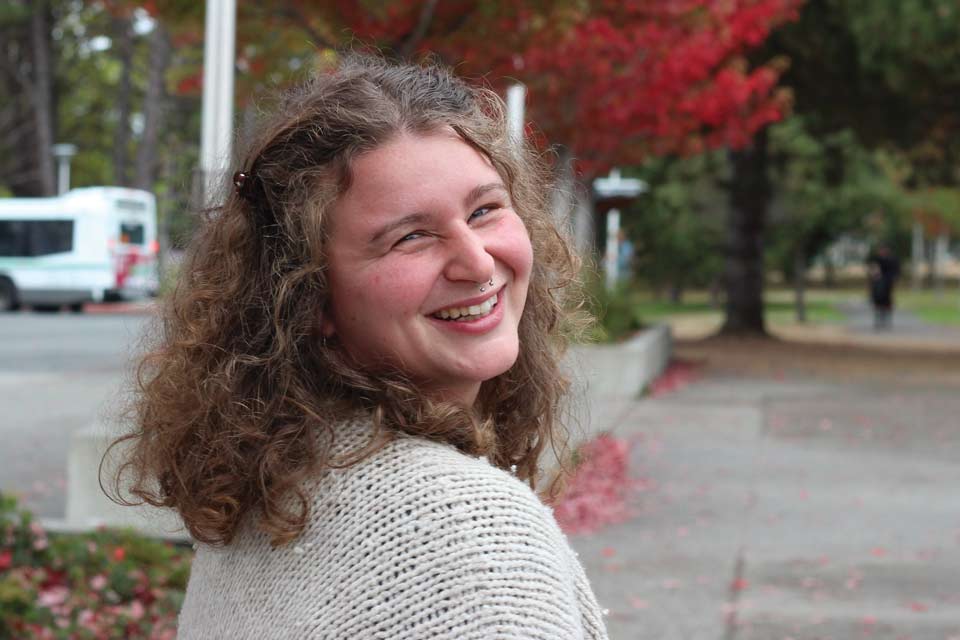
When aliens appeared over Montana in the 2016 blockbuster film Arrival, Caroline Allen—a linguistics undergraduate at the University of Montana at the time—was thrilled. Only a linguist could save the day? Great fiction.
Now graduating from UVic with an MA in linguistics, Allen could argue that the premise of the film is not so far-fetched: when the COVID-19 pandemic arrived in Victoria and threatened to fracture her community, it was she who stepped up.
“Caroline began working in the Sociolinguistics Research Lab in 2018 and very quickly emerged as a leader,” recalls lab director and Humanities Associate Dean Research Alexandra D’Arcy. “When the lab had to close during the pandemic, she actively fostered a sense of connection and belonging by organizing Zoom movie and trivia nights, which kept our team strong.”
Behind the scenes, Allen confides the team helped her as well. Born and raised in Tacoma, Washington, ongoing border closures and strict quarantine rules kept her isolated from close friends and family back home, which made for hard times.
The pandemic was challenging in many ways, but hanging out with other people who care about what you care about is just good for your soul. Being a part of this research lab was the high point of my experience at UVic. I don’t want to say ‘it helped me grow’ or ‘it expanded my mind’ or ‘it made me a better person…’ but… it did. That’s actually how I feel.”
—Caroline Allen, UVic master's grad in linguistics
It also helped that her team was working on a fun task. In the Kids Talk project, led by D’Arcy, the group tracked changes in how kids (aged three to eight) talk over a five-year period, as a means to understand language change more generally.
How language shifts
“We know language changes over time, but we also know that people generally don’t change how they talk after the age of 17, so the broadly-held assumption is that kids advance language change,” Allen explains. “That’s been assumed for a long time, but it’s never been directly observed, so that’s what this project aims to do.”
Allen’s personal research, which she conducted for her MA thesis, analyzed English language variation and change within the passive voice, from the mid-19th century to the end of the 20th—a subject perhaps more esoteric than that of the Kids Talk project, but no less exciting for her, or potentially helpful in understanding how language functions in a social context.
“So, saying ‘the ball was hit’ versus ‘the ball got hit,’ for example. My research showed that people born in 1865 said ‘got hit’ only 3% of the time, while people born in 1995 said it 60% of the time. It’s possible that in 100 years people will only say it that way, and that’s what they will think is the standard,” Allen explains. “People often criticize or make assumptions about the way other groups speak, but studies show that language variation and change are very natural, human and inevitable processes, and that these biases are mostly rooted in racism, classicism, sexism or xenophobia.”
The most commonly cited example of this in North America is white attitudes toward what is known as African-American English—a dialect of English that has been stigmatized and politicized for centuries.
“How language is politicized and weaponized by people who use it as a tool for hoarding power is a question I didn’t even know to ask before starting my degree here,” Allen shares. “Language always changes over time and from group to group; that’s the nature of language itself. We shouldn’t need academic research to prove that different forms of human expression have value.”
Immersing herself in communities and cultures
For her part, Allen is very much in love with people, culture, community and all the joys of being a person in a culture among a community. Her love of language, she says, was shaped in part by her time living in a small city in West Bengal, India, throughout her teens and early twenties, where she was immersed in—and captivated by—the Bengali language. It is clear, though, that her true love is music.
“I love choral singing. I’ve been singing in church choirs since I was 15. I love classical music… and opera. And folk music. I love writing songs…. And I’m learning fiddle!” Allen says with fitful enthusiasm, as if realizing her love of each for the first time. “In one word, though, my passion is ‘vernacular.’ It’s why I love both sociolinguistics and folk music. It’s all about language and music that comes from people.”
It is precisely this love for people and their various modes of expression that made the pandemic so challenging for Allen—a self-proclaimed extrovert whose warmth and empathetic connection to others can be felt across a crowded room—and that pushes her to join communities of practice or build them when one doesn’t already exist.
In addition to her work as manager of the Sociolinguistics Research Lab, manager of the Kids Talk project and music director at Abbey Church, Allen has been heavily involved in “a lot of lesbian community-building initiatives” on- and off-campus while completing her degree. This included supporting a lesbian newsletter started by a friend who found a trove of old 1980s and 90s lesbian newsletters in the UVic Libraries’ archives, and a non-competitive soccer team that Allen and a few others started together.
“In response to the pandemic, my friends and I—like many people—were missing tangible ways of connecting,” she recalls. “And, in general, that’s the case for a lot of queer people who live in isolation, so we wanted to start something that feels like ‘us.’”
Now that she’s finished her degree, Allen will move back home to Washington to spend time with her family, connect with old friends and see what premonitions of the future appear.
Despite her departure, it’s clear that Allen is just one of those people for whom there is no single point of arrival—just one long, wandering, joy-filled journey filled with new people she can’t wait to meet and new mysteries she can’t wait to uncover.
“I feel like I’ve done what I came here to do. I’m proud of my degree. I’m proud of my thesis. I pursued my passions. I gained a lot of transferable skills in quantitative research and project management. What will I do next? I just want to enjoy this moment.”
Photos
In this story
Keywords: convocation, student life, languages and linguistics, community
People: Caroline Allen, Alexandra D’Arcy
Publication: The Ring

